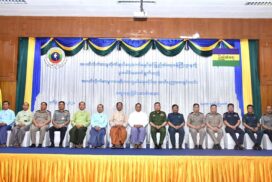Introduction
1. In this article, I would like to quote “an extract from the editorial article of the Global New Light of Myanmar dated 9 December 2022 as follows: –
• “Save the global people from corruption”
• International Anti-corruption Day (IACD), which falls on 9 December 2022, seeks to highlight the crucial link between anti-corruption and peace, security and development. At its core is the notion that tackling this crime is everyone’s right and responsibility and that only through cooperation and the involvement of each and every person and institution can we overcome the negative impact of this crime.
2. Well, bribery and corruption are, in my view, two sides of the same coin. Bribery and corruption are two facts or ideas that are very much correlative. That is to say, they are closely related to or depend on each other fact or idea. For example, a bribe-giver, as an accomplice, aids and abets a corrupt official to commit corruption, and the corrupt official expects or demands and takes a bribe from a person in return for favouritism, the act of unfairly treating him better than others.
3. And now, the question is, what does it tend to corrupt? On this point, I believe I can’t do any better than quote what the scholars have said. They are reproduced, and kindly see below: –
“Power tends to corrupt, and absolute power corrupts absolutely.” “Lord Acton” Historical essays.
“The greater the power, the greater dangerous the abuse.” “Edmund Burke” In a speech delivered to the House of Commons,” UK
“Corruption is a global shame and a sin against good manners and character,” said Mr Ban Ki-moon, a former United Nations Secretary-General.
So, in support of all these scholarly views, I, as a layman, would like to say that corruption is, without a shadow of a doubt, a crime, a shame and a sin. In a much better definition, Professor Syed Hussein Alatas has pointed out that “the association of corruption and crime is a well-known phenomenon”.
4. Corruption: does it mean only bribe-taking? Well, I don’t think so, I am afraid. From the legal point of view, corruption also means maladministration of justice, mismanagement of affairs, prejudice, bias, wrong-doing etc. And mismanagement, in a sense, means failing to do something that ought to be done and committing an act that ought not to be done. Well, before tackling what factors bring about prejudice and bias, I think we should see their meanings. Prejudice means an unreasonable dislike of or preference for a person, group, custom, etc. And bias means a strong feeling in favour of or against one group of people or one side in an argument. In our culture, there are four kinds of prejudice and bias. Prejudice and bias: first, arising from emotional issues or wishes; second, stemming from anger; third, arising from fear; and fourth, arising from ignorance.
5. May I quote relevant writings of a well-known scholar, Mr Syed Hussein Alatas, from his famous book “Corruption and the Destiny of Asia?” “The association of corruption and crime” is a well-known phenomenon. However, the forms of this association vary according to the degree of corruption. As conception develops in intensity, these forms multiply.
6. In this article, I will also present the significance of the rule of law. This phrase, the rule of law, means equality before the laws, fair play, and uniformity of laws for all private citizens and public officials alike. In connection with the rule of law, the first Prime Minister of our independent and sovereign union, U Nu, said in the address to the Parliament (The Pyithu Hluttaw): “is to base all our activities firmly on the rule of law.” SAC Chairman and Prime Minister Senior General Min Aung Hlaing also expresses the significance of the rule of law on every occasion, relevant, proper and necessary.
7. Under the old administration system, BCS — Burma civil service personnel were entrusted and honoured with magisterial powers by our posts and by experience and expertise. While serving as a subdivisional officer, I was empowered and entrusted with special magisterial powers. Our superior officers, such as the district magistrates and the district and session judges, frequently advised and, I would like to say, taught and guided all the subordinate judges and magistrates not to meet or talk exclusively with a client or a party to a dispute, in his or her chamber, or in any place privately. Our superior judges and magistrates explained to all of us that the other client or the other party might misunderstand us. We were taught and guided that a magistrate or a judge should bear in mind that “it is not enough that justice is done, but justice must be seen to have been done”. And to win the hearts and minds of the people we were serving as a judge or a magistrate, we should always go on learning so as to be entitled to be addressed as “the learned judge, “the learned magistrate. Learning in this context means reading and studying laws, the Supreme Court’s instructions, and the Supreme Court’s rulings in earnest and learning anything worth it to improve and expand legal education. After all, no educative process, legal or whatsoever, is ever the end: it is always the beginning of more education, more learning, more living.”
8. I think we have already had a law entitled “Suppression of Bribery and Corruption Act”, and our successive governments have suppressed and treated it as a shame, sin, crime and evil. And, as living laws are necessary in this world, I am sure our authorities concerned have already taken necessary actions to review and revise or, if necessary, to amend the “Suppression of Bribery and Corruption Act” to align with the changing world.
Reference
(1) Corruption and Destiny of Asia, Syed Hussein Alatas.
(2) Oxford Advanced Learner’s Dictionary.
(3) Law and Customs in Burma and the Burmese Family, Dr Maung Maung.
(4) Book of essential quotations.
(5) Word power made easy, Norman Lewis















